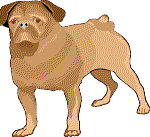|

Dog Facts
Page 2
- Dogs (and wolves and foxes) are descended from a small, weasel-like mammal called Miacis which was a tree-dwelling creature and existed about 40 million years ago. Dogs, as we know them today, first appeared in Eurasia about 13,000 years ago, and were probably a direct descendant of a small, grey wolf (not from the type of jackal or jackal/wolf as previously thought). The dingo is not native to Australia but was introduced thousands of years ago by the first immigrants. Dogs were first domesticated by cavemen in the Palaeolithic age and gradually developed (or were bred) into the breeds known today.
- The tallest dogs are the Great Dane and the Irish Wolfhound. The largest Great Dane stood at 103cm and an Irish Wolfhound 100cm.
- Dogs have been used as guards, hunters, draught animals, eyes for the blind, drug and explosive detectors, rodent controllers- and even weapons! In Roman times and the Middle Ages, mastiffs wearing light armour, carrying spikes and pots of flaming sulphur and resin ran into battle against mounted knights. In World War II the Russians trained dogs to run suicide missions between the tracks of German tanks with mines strapped on their backs.
- Dogs naturally have a wonderful sense of smell. They have many more sensory 'smelling' cells than a man's 5,000,000. A Dachshund has 125,000,000, a Fox Terrier 147,000,000 and an Alsation (often used as a 'sniffer' dog) has 220,000,000. Truffle hounds can find the fungus delicacy even when it's a foot underground.
- The oldest reliable age recorded for a dog is 29 years, 5 months for a Queensland 'heeler' called Bluey in Victoria, Australia. The average dog lives to around 15 years of age.
- Many foot disorders in dogs are related to long toenails. Check your dog's nails once a month and trim when necessary, avoiding the vein.
- Sadly, statistics indicate that eight million pets lose their lives in animal shelters each year due to overpopulation.
- More than five million puppies are born every year in the United States.
- In America, about one family in three owns a dog.
- The normal body temperature for a dog is 101.2 degrees Fahrenheit.
- Though neutering has no effect on the overall personality, male dogs tend to display less aggression, and territorial behavior when they are neutered. They are also less likely to contract urogenital diseases.
- If your dog has bad breath, he may need his teeth cleaned.
- The Boy Scouts, the Girl Scouts, and the 4-H Club all offer merit badges in dog care.
- NEVER punish a puppy for chewing..... just be sure to provide the appropriate objects. Puppies need to chew to stimulate the loss of their baby teeth and to help place their permanent teeth.
- Dogs are pack animals by nature. They need closeness, touching, and petting to be content and happy.
- Dogs are able to see much better in dim light than humans are. This is due to the tapetum lucidum, a light-reflecting layer behind the retina. Because it functions like a mirror, it also accounts for the strange shine or glow in a dog's eyes at night.
Dog Facts page 3
    

© 2001 - present. Australian Media Pty Ltd. All Rights Reserved.
Please read our Legal Statement and Privacy Policy.
|

























